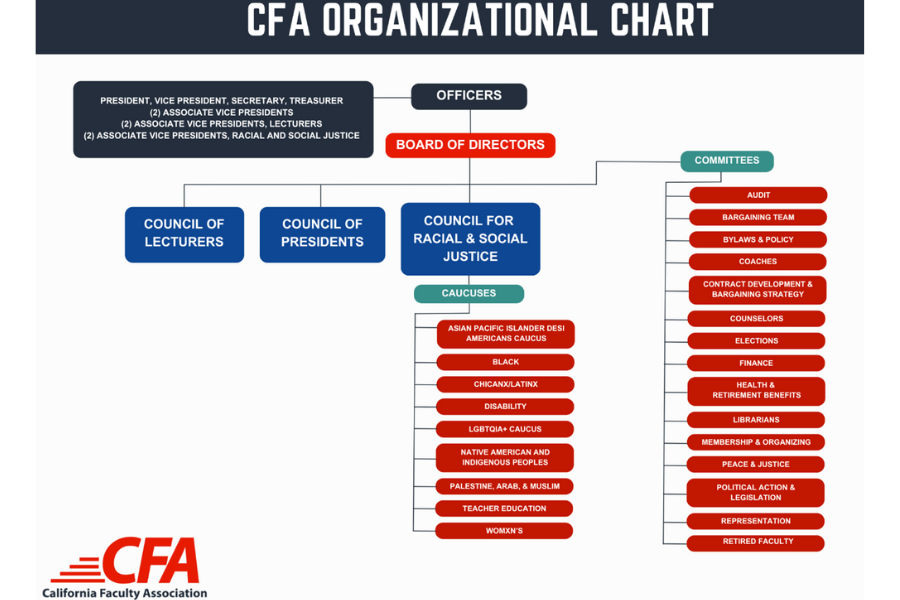Getting to Know CFA: How is CFA Organized?

What is CFA?
We are a member-led union comprised of 29,000 professors, lecturers, librarians, counselors, and coaches within the 23 campuses across the California State University system. CFA is affiliated with the Service Employees International Union (SEIU) and the American Association of University Professors (AAUP).
We are committed to giving the 485,000 CSU students a quality education that allows them to be critical thinkers who have both the technical know-how and cultural insights needed to be thoughtful, productive, and artistic participants in our society.
Unionwide leadership is comprised of officers, a board of directors, councils, committees, and caucuses. Each of these groups are made up of members who hold elected positions at the unionwide level, their chapter, have an interest in a caucus or committee goal, or who simply want to be involved in the work of the union.
Governance
CFA’s primary governing body is comprised of the elected members of the Assembly. The Assembly includes the Unionwide Officers, Board of Directors, Chairs of our standing committees, members elected from the Councils and at large.
Each Spring and Fall Assembly brings together delegates from all of the 23 chapters. Each chapter Assembly delegation is comprised of 1 representative from each of the three Councils and at-large representatives to the Assembly in proportion to Active and Associate CFA membership in the chapter. These representatives review, discuss, and determine the union’s policies, strategies, goals, and objectives.
The Board acts on behalf of the CFA delegates in between the semi-annual Assembly meetings.
The elected Officers include a president, vice-president, secretary, treasurer, and two associate vice presidents – one for Northern California and one for Southern California – to represent each of the following Councils: chapter presidents, lecturers, and racial and social justice. The Officers may act on behalf of the Board of Directors between Board meetings.
Councils
Three councils serve as the advisory body to the Board of Directors:
- The Council of Presidents, which is focused on discussing chapter concerns and implementing CFA’s unionwide plans
- The Council of Lecturers, which is focused on promoting lecturer rights and protections
- The Council for Racial and Social Justice, which is focused on cultivating an anti-racism and social justice lens while dismantling the many forms of oppression
These councils are comprised of member leaders elected at each of the 23 chapters. All three councils meet regularly to strategize and work collectively towards a better university for faculty and students.
Council for Racial & Social Justice
Caucuses
Caucuses belong in the Council for Racial and Social Justice. They provide a space for members to discuss important issues that may not be addressed by committees or other structures of the organization. Caucuses aim to increase participation from members with shared interests and provide them with opportunities to engage in CFA’s decision-making process.
Any caucus seeking to access or request resources from CFA must clearly define its purpose and how it aligns with CFA’s mission. They must also work with the guidelines and procedures set by the Council for Racial and Social Justice. Caucuses cannot be formally affiliated with organizations not affiliated with CFA.
Below is a list of different caucuses you can get involved with:
Asian Pacific Islander Desi Americans Caucus
Native American and Indigenous Peoples Caucus
Palestine, Arab, and Muslim Caucus
Committees
Committees serve as groups that specialize in key areas within the union. For instance, they could be tasked with political advocacy and outreach to our legislators, overseeing our finances, or advocating for a particular member group (e.g., coaches or librarians).
Successful campaigns begin with having strong organizing committees, and they are essential to creating a robust union that is capable of achieving its goals of securing better working conditions and a solid contract for all faculty.
Not only do committees involve members who can provide valuable wisdom and experience, they also provide a space for emerging leaders to grow and test their skills.
Not all the committees listed below are standing committees nor do the chairs hold Board positions. The Audit Committee and Peace & Justice Committee are just two examples of this.
Contract Development & Bargaining Strategy
Health & Retirement Benefits Committee
Membership & Organizing Committee
Political Action & Legislative Committee
Why Should You Get Involved?
If you care about rights, respect, and justice for our stakeholders – our faculty, staff, and students – then it’s simple. Becoming a member activist allows all of us to effectively strategize and push for meaningful change on our campuses. It also ensures that the perspectives of our members are honored and that our concerns are addressed.
By engaging with the councils, caucuses, and committees, you can greatly contribute to the success of our union and achieve justice within the university system and beyond.
Join California Faculty Association
Join thousands of instructional faculty, librarians, counselors, and coaches to protect academic freedom, faculty rights, safe workplaces, higher education, student learning, and fight for racial and social justice.